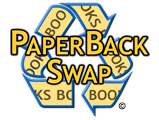Reducing Book Clutter (Part 3): Trading Books Online
There are various routes for bibliophiles to read to their hearts’ content without building up a clutter of titles they’re unlikely to revisit. Recently, we talked about renting books for adults and children. However, while renting books generally guarantees you’ll balance the influx with returns, a monthly flat fee can be an obstacle. Book trading or swapping, conversely, allows you to read books and set them free at a more personalized pace.
Chances are, you probably already trade books on an informal level, offering up books you loved (or hated, but think your friends might like). Unclutterer‘s Erin Doland introduced me to the cozy Aunt Dimity mysteries, and Nanette Duffy shared the ubiquitous Eat Pray Love. Paper Mommy and her pals trade magazines as well as books.
Dovetailing with what we’ve said previously, John Buckman, BookMooch’s creator, understands how difficult it is to let a book leave your home: “If you’re passionate about books, you know how emotionally difficult it is to throw a book away, even if you will never read it again. You want to find a good home for your books, [and] have them find someone who appreciates them.”
Obviously, Paper Doll would never encourage throwing away a book unless it were irredeemably damaged or mold-covered. However, the following sites formalize trading, offering a satisfying method for acquiring…and letting go…of books:

PaperBack Swap — PBS, the oldest successful online club enables members to trade (hardcover, paperback and audio) books for merely the cost of postage. Books get to you for free, and you pay to ship books to others.
1) Register online with your email and mailing addresses. Membership is free for charter members, though PBS reserves the right to charge $10 or $20 per year…someday.
2) List the books you have available to swap, including title, author, genre, and ISBN. You get two book credits for registering the first 10 books you’re willing to trade; use those to request your first two books to receive.
3) Search the swap library by title, author or genre for books you want to request. Then, click the “Order This Book” button next to the title you want and it will be sent to you, for free, to keep forever (or sell, trade or wear as a fashionable hat).
4) Fulfill requests from other members. If someone requests one of your books, PBS will send you an email providing the book title and mailing information. Click the Print Wrapper link in the request to take you to an online kiosk that will calculate postage and provide a printable mailing address label/wrapper. (Postage cost gets calculated according to the book’s weight. Currently, books under one pound cost about $2.23 to mail.)
Affix your own postage or purchase postage from the kiosk for a small fee (after loading your account with PBS Money). Print the label/wrapper, wrap the book(s) and mail. Once the recipient notifies PBS that the book has been received, you get an email alerting you that you’ve gotten another book credit. You’ll also see your credits in your online account. If you run low on books to offer, you can purchase up to 30 credits/month at $3.45/credit.
PaperBack Swap boast almost 5 million books in circulation, a social networking function, discussion boards, live chats and a “book passport” to see the swapping history of any given book.

BookMooch is another major player in the book-swapping arena and, like PaperBack Swap, runs on a point system, albeit one that’s a little more complex.
Members can earn points when they add books to their inventories (at one-tenth of a point per title), send books to other members and/or give feedback about their experience receiving books. Points can then be used towards requesting more books.
Although all books are valued at one point each, international “mooches” have a multiple point surcharge (because of users’ higher costs in mailing internationally). If you ship a book internationally, you earn three points; if you receive a title from abroad, you’ll be charged two points. Members may choose whether to send their books domestically, internationally, or internationally but only upon request.
1) Create an account with your email address, user name and mailing address. Then start listing the books you have available to trade.
2) Once you receive a request for a book on your list, mail it to the club member at your own cost and receive a point of credit.
3) Use the points you receive to request books from other members, and they’ll be sent at no cost to you.
In addition to maintaining a list of books you have available to swap, you can develop your own wish list on the site. Search by genre to see how many copies of any book are available. If you have enough credits to receive a swap and the title becomes available, you’ll be sent an alert. Recipients leave feedback about the swapping transactions, much like on eBay or Amazon. Members gain a point for leaving feedback, and the senders get richer feedback histories, making others more likely to swap with them.
BookMooch covers operating costs with Amazon commissions, earned when someone follows an on-screen link and elects to buy a book from Amazon instead of “mooching” it.
BookMooch users may donate their points to various charities, including those for new mothers, schools, prisons, sick children and international non-profits.

Bookins operates much like PBS and BookMooch, with two main exceptions. First, the payment system is reversed. You pay nothing to ship books (or DVDs), but pay a flat fee of $4.49 (no matter the weight) for any book you receive. That covers actual shipping, delivery confirmation and merchant fees, plus about $1 towards operating costs. Currently, users are charged that flat fee each time a book is shipped to them; Bookins anticipates switching to one collective monthly charge in the near future.
Second, the automated point system (used to track the value of books/DVDs ) is variable. If you trade in a 10-point book, for example, you could opt to trade it for another 10-point book or DVD, get two 5-point books in return, or bank your points to exchange for a 20-point item later on.
List the books you have available to trade on your “trade list” and those you desire on your “want list”. As users request your books, you’ll be notified to ship them and will generally have 48 hours to reply to the alert email and print (at no cost to you) a system-calculated, pre-paid postage label for the book(s) you’ll send. (You can’t use your own postage, as the tracking procedure depends on using Bookins’ U.S.-only postage system.)
As you earn points, the system notifies a member who has a title you want and prompts it to be sent. If that person is unable to ship, Bookins contacts another trader. However, because receipt of books is based on individuals (and their busy, possibly disorganized, lives) rather than availability in a central warehouse, users are cautioned to add as many titles as possible to their want lists, to increase opportunities.
You can pause your account so that neither shipping request alerts nor books will arrive when you’re away or busy, and you can choose to go “ship only” in case you’re blessed with too many books to read or cursed by a lack of available time.
Bookins also seems to be the only trading site with its own theme song!
The world of book-trading continues to expand:

Title Trader — Swap books, textbooks, CDs, and DVDs at no cost for basic trades. Membership points are earned by shipping items (once you receive positive feedback), referring members or purchasing points. Premium memberships, at $19.95/year, include features like automatic wishlist availability notifications, saved searches and buddy lists.

Swap.com (formerly Swap Tree) is a little different from the other swapping sites. There’s no point system to worry about. You simply list books, movies, music and games that you’re willing to trade (via an ISBN or UPC code), and Swap.com shows you all of the possible items you can receive in trade. Clicking “Get Now” reveals more detailed information about the item and the swapper. I entered Donna Goldberg’s The Organized Student and found 152 books (categorized by genre), plus a smattering of movie and music options, for which I could exchange it.
If someone wants one of your items, you’re notified by email and via your on-screen account, and if you accept, you pay only for shipping the item you send (via USPS Media Mail). Use the Swap.com site to purchase a postage label or just go to the post office. Of course, you can request items from other swappers and check their feedback ratings.
Swap.com displays a quirky sense of humor, as evidence by the on-screen caveat:

Swap.com must have us confused with another member; our chair had a black and white cow pattern, and Paper Mommy gave it away years ago!
![]()
Readers United — Once you have an account, just type in the ISBN barcode numbers, and Readers United populate the list with details of books you’re ready to swap. Users earn credits according to the value a book is automatically assigned depending on the retail price, condition and estimated postage cost (based on size and weight). Shipping a book internationally earns you more credits. You can also choose to purchase credits, and/or earn bonus credits by recommending friends to the site.

What’s On My Bookshelf — Every book registered as available for trading is designated a credit value based on the original retail price. Users are awarded one point for every five titles listed (for the first 100 books listed). If a user requests a book, the credit value of the book is transferred to the user who ships it.
International users might be interested in:

BimBamBim is a book-trading site specializing in children’s books, but will soon also include trading of CDs, DVDs and games. Books are available in English and German, and language availability is set to expand. The UK-based site prioritizes book search algorithms to match traders in the same or nearby cities, avoiding postal costs altogether when possible.
![]()
ReadItSwapIt, a UK-based site, has a charming, points-free, one-to-one trading system. When you locate a book you want in the system’s library, you can choose from whom you’d like to request it based on feedback ratings; the owner may choose to accept or reject the swap. With most of the other services, a point system allows you (Person A) a chance to receive books from Persons B, C and D and send books to Persons X, Y and Z, and they can all unilaterally send or receive. With ReadItSwapIt, each exchange is a one-to-one swap. The number of books you can request depends on the amount of positive feedback you’ve received from other users over time.

Jauntster is a UK-based niche book-swapping site specifically for travel guides. So, whether you’re an armchair traveler and accidental tourist who just loves to read about far-off destinations or a bibliophile with wanderlust and a passport, this site connects you with others who have the guidebooks you need.
After a speedy, simple registration, you list any travel guides you have to offer. The site isn’t entirely intuitive — be sure to check the Help section, where the instructions live. Jauntster has also begun hosting “mini-blogs”, so you can microblog about your travel destinations.
Next week, in honor of National Library Card Sign-up Month, we’ll talk about the delights and drawbacks of borrowing books and how to organizing the borrowing process to keep your clutter at a minimum.




Follow Me